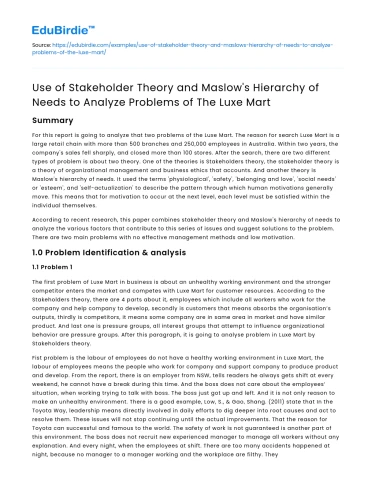Introduction
In contemporary business environments, understanding the multifaceted nature of corporate operations is crucial for sustainable success. Luxe Mart, a leading retail giant, offers an intriguing case study for the application of Stakeholder Theory and Maslow's Hierarchy of Needs. Stakeholder Theory, as proposed by Freeman (1984), suggests that businesses should consider the interests of all stakeholders, not just shareholders, to achieve long-term success. Meanwhile, Maslow's Hierarchy of Needs (Maslow, 1943) provides a framework for understanding human motivation, which can be applied to employee and customer satisfaction within a company. This essay explores how these two theoretical models can be integrated to analyze Luxe Mart's strategic and operational approaches. By examining real-life scenarios, such as employee engagement and customer service strategies, this paper aims to provide a comprehensive analysis of how Luxe Mart can balance the diverse needs of its stakeholders while fulfilling the intrinsic motivations of its workforce and clientele.
Stakeholder Theory: A Multifaceted Approach
Stakeholder Theory posits that by addressing the needs and expectations of diverse stakeholder groups, companies can achieve a competitive advantage and ethical business practices. At Luxe Mart, stakeholders include employees, customers, suppliers, investors, and the community. Each group demands specific considerations, and failing to meet these can result in reputational damage and financial loss. For instance, Luxe Mart's strategic partnerships with ethical suppliers ensure that it maintains social responsibility, aligning with the values of conscientious consumers. By prioritizing ethical sourcing, Luxe Mart not only strengthens its brand image but also secures customer loyalty, which is critical in a competitive retail landscape.
Save your time!
We can take care of your essay
- Proper editing and formatting
- Free revision, title page, and bibliography
- Flexible prices and money-back guarantee
Furthermore, employee satisfaction is a critical aspect of Stakeholder Theory. Luxe Mart has implemented comprehensive training programs and career advancement opportunities, which align with stakeholder-oriented management principles. These initiatives demonstrate the company's commitment to its workforce, resulting in higher job satisfaction and reduced turnover rates. According to a study by Jones et al. (2007), companies that integrate stakeholder considerations into their core strategies tend to perform better financially and socially. By implementing stakeholder-oriented strategies, Luxe Mart not only improves its operational efficiency but also fosters a positive corporate culture that attracts top talent and retains valuable employees.
Maslow's Hierarchy: Understanding Human Motivation
Maslow's Hierarchy of Needs provides a valuable framework for understanding employee and customer motivation within Luxe Mart. The hierarchy begins with physiological needs and progresses through safety, love and belonging, esteem, and self-actualization. For Luxe Mart employees, ensuring that basic needs are met, such as competitive wages and safe working conditions, forms the foundation of their motivation. By addressing these fundamental requirements, Luxe Mart can enhance job satisfaction and productivity.
As employees progress through the hierarchy, their needs evolve towards belongingness and esteem. Luxe Mart addresses these through team-building activities and recognition programs, fostering a sense of community and appreciation. According to Herzberg's Two-Factor Theory (1959), such motivational factors are crucial for job satisfaction and can significantly impact employee performance. Moreover, self-actualization is supported by offering opportunities for personal growth and career advancement, which aligns with Luxe Mart's emphasis on employee development.
For customers, Maslow’s theory can be applied to enhance the shopping experience. Luxe Mart ensures a welcoming environment and high-quality customer service, addressing the psychological and esteem needs of its clientele. By creating a sense of belonging and recognition, Luxe Mart not only enhances customer satisfaction but also promotes brand loyalty. This strategy is exemplified by the personalized shopping experiences offered through their loyalty programs, which cater to customers' higher-order needs.
Integrating Theories for Strategic Advantage
The integration of Stakeholder Theory and Maslow's Hierarchy offers Luxe Mart a robust framework for addressing both external and internal challenges. By aligning stakeholder interests with the intrinsic motivations of employees and customers, Luxe Mart can create a harmonious business environment that supports sustainable growth. For instance, while Stakeholder Theory emphasizes ethical sourcing practices, Maslow's Hierarchy highlights the importance of addressing employee esteem needs through recognition of such efforts. This intersection allows Luxe Mart to create a cohesive strategy that promotes ethical conduct and employee satisfaction simultaneously.
Counterarguments suggest that balancing stakeholder interests can lead to conflicting objectives, potentially hindering business performance. However, Luxe Mart's approach demonstrates that through strategic alignment of stakeholder interests with motivational factors, these challenges can be mitigated. By fostering a culture that values transparency and ethical practices, Luxe Mart not only addresses stakeholder concerns but also enhances its market position. This is supported by a study from Hillman and Keim (2001), which found that stakeholder-oriented strategies positively correlate with stronger financial performance and competitive advantage.
Conclusion
The application of Stakeholder Theory and Maslow's Hierarchy of Needs provides a comprehensive framework for analyzing Luxe Mart's strategic and operational dynamics. By addressing the diverse needs of its stakeholders and understanding the intrinsic motivations of its workforce and customers, Luxe Mart can achieve a sustainable competitive advantage. Through ethical sourcing, employee development, and enhanced customer experiences, Luxe Mart exemplifies how integrating these theoretical models can lead to improved business performance and societal impact. While potential challenges exist in balancing conflicting stakeholder interests, Luxe Mart's strategic alignment demonstrates that such integration can lead to holistic success, reinforcing the relevance and applicability of these theories in modern business practice.






 Stuck on your essay?
Stuck on your essay?

